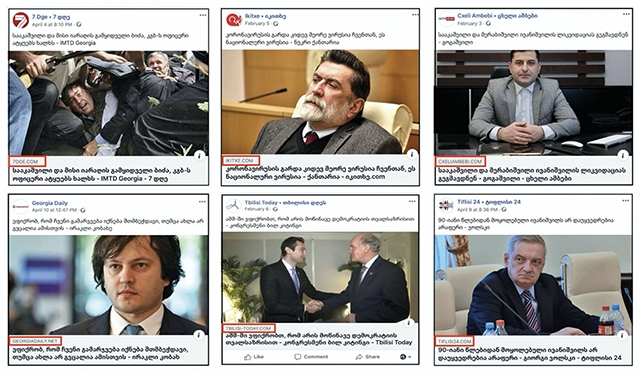Facebook Removes Hundreds of Propaganda Pages, Accounts in Georgia
This week, Facebook announced that it had removed 511 assets from its platforms which discredited opposition parties and supported the ruling party, Georgian Dream. The accounts, pages and groups were linked to the Espersona media company, which has links to Georgian Dream.
The Atlantic Council Digital Forensic Research Lab (DFRLab), responsible for investigating the assets on behalf of Facebook, released an in-depth report on their work.
The report noted that a further 23 Facebook accounts, 80 Pages, 41 Groups, and 9 Instagram accounts investigation had been linked to individuals associated with the opposition party United National Movement. “We found this activity as part of our investigation into suspected coordinated inauthentic behavior in the region. Our assessment benefited from local public reporting in Georgia,” DFRLab said.
In particular, of the 511 aforementioned assets, DRFLab identified pages, groups, and accounts on Facebook and Instagram that mimicked Georgian health authorities and political opposition members, seeking to discredit pro-democracy activists and members of the opposition.
Although those behind the assets attempted to conceal their identity, often using fake accounts, DRFLabs investigation traced them to Esperona, which is owned by the former head of the Department of Public Relations of the Government of Georgia, Koka Kandiashvili.
He worked for Georgian Dream from April until December 2013, before becoming a consultant to the Government on public relations.
Kandiashvili has been accused of improper information operations in Georgia before. Recently, local media and NGOs linked him to a troll factory, a claim he has repeatedly denied. Facebook removed his personal account, as well as his managed pages, groups and the account of his ex-wife, Nona Kandiashvili.
Espersona also took advantage of the COVID-19 pandemic. DRFLab identified fake pages impersonating prominent health official Levan Ratiani, which regularly posted updates about the COVID-19 outbreak in the country.
The investigation also identified 269 inauthentic pages and fringe news agencies which had around 8,400 followers in total, and that published pro-government and anti-opposition content. Most of the pages were created on the same day in 2019, and had similar “About” descriptions and external websites, making it highly probable they were managed by the same body.
In addition, Facebook removed 99 groups that posted diverse content, such as news and religion. These groups were often run by the same administrators and were used to share content from the fringe news agencies.
This is not the first time Facebook has removed assets related to Georgia from its platforms. In 2019, assets by private marketing firm Panda, which is also linked to Georgian Dream, were taken down.
With parliamentary elections to be held at the end of the year, Georgian Dream is promoting its public image to help its political agenda, especially following many anti-government protests in 2019. The use of fake groups and accounts can heavily influence the online political climate in a country, and in turn, reflect on voting.
The spread of disinformation online threatens democracy in Georgia, which has already slipped over the past two years, according to figures by the Economist Intelligence Unit. A report released by Freedom House, a US-based NGO, similarly assessed that Georgia’s level of democracy had slipped from 3.29 to 3.25. Georgia is classed as a hybrid democracy, however Freedom House noted that the country has moved closer towards an authoritarian regime in several parameters over the past year.
By Amy Jones












